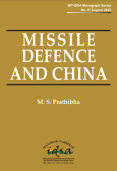Examining China’s Hydro-Behaviour: Peaceful or Assertive?
China is a thirsty country desperately in need of water—a lot of it. In order to meet its water and energy requirements in the densely populated and fertile northern plains, it is successively making interventions in the Tibetan rivers in the southern part through dams and diversions. While China is well within its riparian rights to do so, a set of externalities involving the principles of water-sharing and lower riparian needs—stretching from Afghanistan to Vietnam—raise concerns.
- Uttam Kumar Sinha
- January 2012











